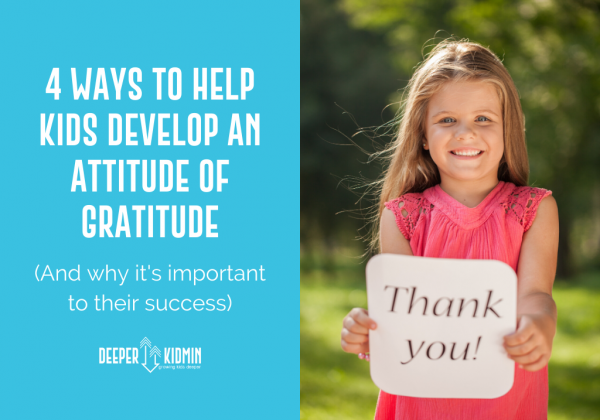
One of my favorite Christian authors, Dr. Caroline Leaf, is a communication pathologist and cognitive neuroscientist who studies how the brain and body work together. (Seriously, y’all, she’s brilliant.) I stumbled upon one of her blog posts recently that talked about how having an attitude of gratitude leads to success. Here’s what she said…
Did you know that gratitude is essential to success? If you can’t appreciate what you have to be thankful for right now, it is harder to achieve what you desire in the future. In fact, gratitude changes the brain and body for the better! Research on the effects gratitude has on our biology shows how being thankful increases our longevity, our ability to use our imagination, and our ability to problem-solve.
You can read even more of what Dr. Leaf has to say about gratitude here, but her post got me thinking: if gratitude is essential to success, how do we help kids have a gratitude mindset?
Here are 4 ways to help kids develop an attitude of gratitude:
- Give Them Opportunities to Serve – The best way to teach gratitude is to give kids the opportunity to serve others. Whether that’s at church, through a special service project for kids, or even encouraging families to think intentionally about serving, serving cultivates thankfulness.
- Help Them Reflect – Life is busy. Crazy busy. But if we can help kids slow down and take time to reflect on all they have to be thankful for, it will help teach them to pause and consider their blessings even in the midst of the chaos. This might look like a moment of silence right before your prayer time at church, or small group questions that encourage kids to think about something good that happened that week. You could even share a 30 Days of Thankfulness Calendar or cards with the families in your ministry to help them reflect all month long!
- Form Habits of Thankfulness – I use this One-Line-A-Day Memory Journal as a gratitude journal, and each night before bed, I write down at least 3 things I was thankful for that day. This ritual has become part of my bedtime routine, and while kids may not write down daily thanks, finding ways to incorporate thankfulness in daily lives will help gratitude come more naturally. Maybe that means writing thank you notes every time a child receives a gift or card. Maybe that’s asking “What are you thankful for today?” every night at bedtime. Whatever the habit is, kids can include gratitude year-round, not just during the Thanksgiving season. (And if your kids like to write/journal, check out our free Thankfulness Log!)
- Model it – Kids learn from what they see others say and do. So if we model gratitude in our lives and our ministries, we’ll foster that same attitude in kids. This might even be as simple as letting kids hear you say “thank you” to your volunteers every week, or incorporating a sentence about what we want to thank God for in our prayers.
Developing a gratitude mindset in kids requires intentionality, but it’s not difficult. And when we help kids cultivate an attitude of gratitude, we set them up for success in more ways than one.

Want to help kids “Gobble Up Gratitude” all month long? Check out this 4-week faith family kit designed to help kids and families develop habits of thankfulness in the month of November! Learn more here.

2 Comments
[…] are countless verses in the Bible that help us express our gratitude to God, and when we can help kids develop an attitude of gratitude, we set them up for lifelong habits of success in a variety of […]
[…] be upon us. It will be a month focused on gratitude and thankfulness, and we’ve even shared 4 ways to help kids develop an attitude of gratitude in the past. But if our focus ends at gratitude, we do our kids and families a […]